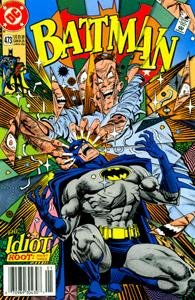
Most of these "Knightfall"/"Knight After" entries have dealt with my adventures in cyberspace, but an equally important, and far older, dimension of my batlife happens offline. The boundaries between roleplay with online friends/enemies and solo batplay have always been a little blurry for me, so I thought I'd devote this entry to some resources and experiences that don't necessarily involve outside players. (Yes, faithful reader, this is the link-filled post I've been
promising for some time now.) This time around I'm just gonna present a few of the active and potential tools in my virtual utility belt, in the hopes that eventually I'll say more about how I've actually been using them lately.
1. I've been looking for an opportunity to write about
Daniel Pinchbeck's book
Breaking Open the Head here ever since I first started reading it about a year ago. I finished it several months ago and moved on to other subjects in this blog before I had a chance to discuss it, but
this recent profile of Pinchbeck in Rolling Stone gives me a handy excuse to bring him up at last. (Clicking the last two links will tell you much more about his work than I could possibly accomplish in any paraphrase.)
I first heard the guy in a late-night broadcast of the UFO/ESP/conspiracy-theory radio wonderland which is
Coast to Coast with George Noory (successor to Art Bell's show) a few years back. I happened to be in the midst of a solo bat-adventure at the time, and Pinchbeck's tales of drug-induced conversations with the universe struck a chord with me. It took me quite a while to track down his book in a store (though I could easily have ordered it
here), and when I did, I was fascinated by what I found. Also a little horrified, since most of his adventures involve travelling to remote rainforests, near-psychotic breaks, and lots of puking, none of which has ever appealed to me. But the core of his story is remarkable for how closely it mirrors my own much tamer explorations with expanded consciousness. (A magic brownie is about as far as I'm willing to go, and that, combined with my active imagination, takes me plennnnnnnty far for my purposes.)
I realize I should probably quote a relevant passage or two, but that would require more effort than I should probably exert if I'm ever to get this long-delayed entry posted. Maybe I'll track down a few key lines for a future post. For now, instead,
here are four lengthy excerpts from the book plus one outtake I haven't read yet which should give you a representative taste. The RS article also tipped me off to Pinchbeck's
followup book and
his forthcoming magazine/business endeavor. Oh, and here's a link to
the writer's own blog on Amazon.com, which includes
his thoughts on the RS story.
1a. Sooner or later I'm gonna have to follow Pinchbeck's recommendation to learn more about
Terence McKenna's writings on similar concerns. When I do,
this page of audio clips is sure to come in handy. Even more enticing:
this collection of "Psychedelic Salon" podcasts, featuring talks by Pinchbeck, McKenna, and a dozen or so fellow travellers.
2. The subject of lucid dreaming is another one I've been meaning to introduce here for quite a while. In a sense, solo (and even group) batplay is, for me, something very like a lucid dream, in that it is a fantasy state I can enter and find myself collaborating with ... something or other: my own subconscious? the great beyond? One of my first introductions to the phenomenon came through a CD I picked up used a while back, a spoken-word-and-ambient-electronic project on the always-interesting em:t label called
em:t 0096: lucid dreams. The speaker is Celia Green, a British writer who was one of the first to address the topic way back in 1968. There are
a few audio clips (and another Coast-to-Coast sighting, no surprise) on this page, in conjunction with
this documentary I just learned about. More recently, I've explored some of the
how-to advice offered along with much more info on LD at
this site. I found the advice so helpful that I decided to order
webmaster Marc VanDeKeere's self-published manual, though I haven't started reading it yet. (It's in digital form only, and that doesn't sound like much fun to wade through.)
3. I'm finding tremendous parallels between the material above and various Buddhist lectures from the Insight Meditation Center in California, archived as podcasts at the amazing site
Audio Dharma, a real treasure trove of information. I found the site while searching for information on
Vipassana meditation, and I'm slowly making my way through the nearly 200 lectures available for free thus far.
4.
Grant Morrison's website contains his wild, tongue-in-cheek
treatise on "Pop Magic", the premise of which is essentially that the way to go beyond the surface layers of reality is to "Declare yourself a magician, behave like a magician, practise magic every day." The author of
Batman: Arkham Asylum then provides you with brief lessons on focus, meditation, and the construction of sigils, among other things. It's fun and funny, and maybe some day I'll actually try some of the exercises Morrison proposes. (BTW, if Morrison's site doesn't keep you busy enough, head over to fellow comics writer
Warren Ellis's blog--another must-read, as my links list to the right suggests.)







